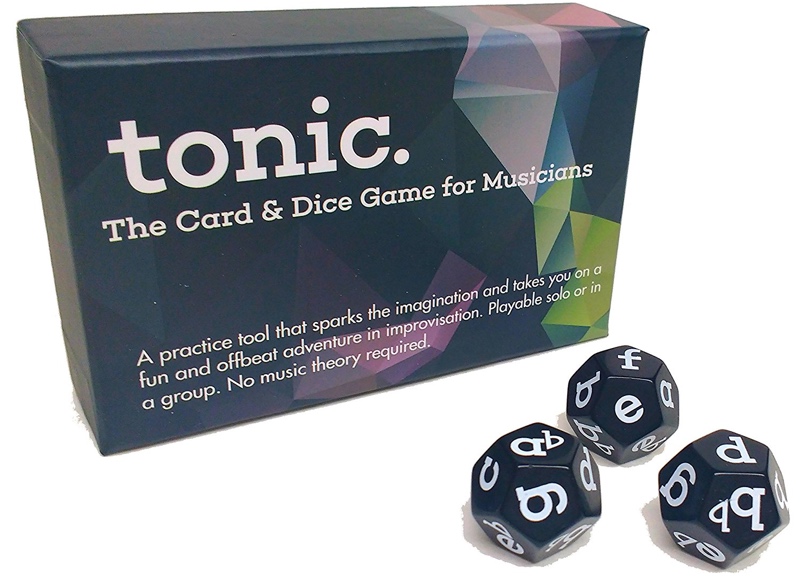Home » Jazz Articles » Product Review » Tonic Games To Cure What Ails You
Tonic Games To Cure What Ails You

One or all of those three nagging issues—where and how to start, where to go next, and how to avoid getting into a rut—will plague every musician at one time or another, regardless of individual knowledge and skill level. All of the scale workouts, Jamey Aebersold books, and transcriptions in the world won't change that. Sometimes you just need to find a way to simply enjoy the tied-together experiences of exploration and discovery. That's where these products come in.
Tonic: The Card & Dice Game for Musicians
Scott Hughes, creator of Tonic, developed this particular take-a-step-back game to serve as a different and fairly easy way for musicians to get their feet wet in the world of improvisation. It also serves as a response to his own experiences and frustrations. "Every book and every well-meaning teacher was telling me to practice something different," noted Hughes. "It caused me anxiety, and the more I talked to people, the more I realized I wasn't alone. Improvisation shouldn't be complicated. My goal is to make it simple again."
The subtitle-cum-explanation for this product notes that it's "a practice tool that sparks the imagination and takes you on a fun and offbeat adventure in improvisation. Playable solo or in a group. No music theory required." That really says it all without being too wordy. The seventy cards that come neatly stacked in a box have basic instructions that allow for on-the-spot creation without the oft-associated fear of doing "the wrong thing." Hughes removes the concept of mistakes by simply cutting away the scales-fit-chords idea and other such notions.
Each card contains simple instructions or ideas. One might provide a visual cue, asking for the player to mirror that with their instrument; another might focus on the alternation of short and long sounds without any other restrictions; and a third may tell the player to simply limit themselves to two notes, allowing for focus on quality of thought rather than quantity of options. The package also includes twelve-sided musical dice, which aid in the selection of pitches for certain cards, and an instruction sheet that includes the game's open-minded rules and a list of basic musical terms. While this particular Tonic product is ideal for those starting at or near the ground floor, it also carries a certain appeal for those who just want to break free from jazz education orthodoxy and fly unburdened. A different perspective or angle can always further one's art, and this product proves it.
Tonic: Theory Edition
The aforementioned game serves the absolute widest range of musicians—pure novices to the musically advanced. Tonic's Theory Edition, however, isn't for everybody. It's a chord-progression-knowledge tool that's only user-friendly for musicians at or above a certain level. If you don't have at least some rudimentary harmony knowledge—understanding the spelling of chords and how to extract notes/intervals from roman numerals—you're probably not ready for this. But if you're there or well past that point, this could be a very valuable tool.
This deck contains fifty-two cards, most of which deal with detailing the chord progression of a well-known song or songs. There are no directions on the cards, beyond the simple recognition that certain chord sequences are must-learn progressions, but the information itself can serve many purposes. A musician could sit behind the piano or grab a guitar to work through these ideas, create their own contrafact with the help of the provided progression, improvise over the chords, or grab staff paper and sketch out the notes that fit each chord in order to understand how the harmonic movement makes sense. These cards appeal to catholic tastes and wide-ranging levels of complexity, running the gamut from Johann Pachelbel's "Canon in D" to D'Angelo's "Untitled (How Does It Feel)" and covering everything from a simple I-IV-V-I to Coltrane changes.
While Hughes created his Tonic products to aid in outside-the-box thinking, and they truly do move beyond jazz education norms, both of these products would certainly come in handy in schools. The Theory Edition could have great applications in a music theory classroom setting and The Card & Dice Game for Musicians is an ideal tool to help reluctant students take the first leaps toward becoming improvisors. But regardless of where you use them, both are worthy additions to the jazz musician and educator toolboxes.
< Previous
More Essentials
Comments
Tags
For the Love of Jazz
 All About Jazz has been a pillar of jazz since 1995, championing it as an art form and, more importantly, supporting the musicians who create it. Our enduring commitment has made "AAJ" one of the most culturally important websites of its kind, read by hundreds of thousands of fans, musicians and industry figures every month.
All About Jazz has been a pillar of jazz since 1995, championing it as an art form and, more importantly, supporting the musicians who create it. Our enduring commitment has made "AAJ" one of the most culturally important websites of its kind, read by hundreds of thousands of fans, musicians and industry figures every month.


















